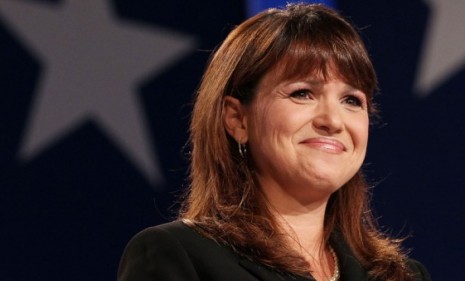Christine O'Donnell: A lying elitist?
Conservatives who bash Ivy League liberals love O'Donnell, but her false academic claims make her the real elitist, says Newsweek's Ben Adler.

A free daily email with the biggest news stories of the day – and the best features from TheWeek.com
You are now subscribed
Your newsletter sign-up was successful
Republicans are "famously suspicious" of cultural elites with lofty educational credentials, says Ben Adler at Newsweek — scorning, for instance, the Ivy League backgrounds of President Obama and many of his appointees. So it's "pretty ironic" that Christine O'Donnell, the Sarah Palin-backed Republican Senate candidate in Delaware, "has just been caught for the third time dishonestly inflating her academic achievements." Although she has said for years that she graduated from Fairleigh Dickinson University, she just completed her bachelor's degree last summer. Claims that she had taken graduate courses at Princeton also proved false. And now it has emerged that O'Donnell's LinkedIn bio lists "University of Oxford" as a school she attended — but the course in question was offered by the Phoenix Institute, which just rented space from the elite British school. Pathetic, says Adler, but also telling. Here, an excerpt:
What makes this irony particularly rich and amusing is that, unlike actually going to Oxford or Princeton, lying about where you went to school really is elitist. Rush Limbaugh and Jay Sekulow attacked Elena Kagan as an elitist for having gone to Harvard Law but the mere fact that she went there does not show that she thinks one's worth is measured by where they went to school.... By contrast, pretending that you took courses at Princeton or Oxford when you did not, and you are many years past college-age, demonstrates that you think having done so is really a necessary credential.
Read the full article at Newsweek.
The Week
Escape your echo chamber. Get the facts behind the news, plus analysis from multiple perspectives.

Sign up for The Week's Free Newsletters
From our morning news briefing to a weekly Good News Newsletter, get the best of The Week delivered directly to your inbox.
From our morning news briefing to a weekly Good News Newsletter, get the best of The Week delivered directly to your inbox.
A free daily email with the biggest news stories of the day – and the best features from TheWeek.com
-
 How the FCC’s ‘equal time’ rule works
How the FCC’s ‘equal time’ rule worksIn the Spotlight The law is at the heart of the Colbert-CBS conflict
-
 What is the endgame in the DHS shutdown?
What is the endgame in the DHS shutdown?Today’s Big Question Democrats want to rein in ICE’s immigration crackdown
-
 ‘Poor time management isn’t just an inconvenience’
‘Poor time management isn’t just an inconvenience’Instant Opinion Opinion, comment and editorials of the day
-
 The billionaires’ wealth tax: a catastrophe for California?
The billionaires’ wealth tax: a catastrophe for California?Talking Point Peter Thiel and Larry Page preparing to change state residency
-
 Bari Weiss’ ‘60 Minutes’ scandal is about more than one report
Bari Weiss’ ‘60 Minutes’ scandal is about more than one reportIN THE SPOTLIGHT By blocking an approved segment on a controversial prison holding US deportees in El Salvador, the editor-in-chief of CBS News has become the main story
-
 Has Zohran Mamdani shown the Democrats how to win again?
Has Zohran Mamdani shown the Democrats how to win again?Today’s Big Question New York City mayoral election touted as victory for left-wing populists but moderate centrist wins elsewhere present more complex path for Democratic Party
-
 Millions turn out for anti-Trump ‘No Kings’ rallies
Millions turn out for anti-Trump ‘No Kings’ ralliesSpeed Read An estimated 7 million people participated, 2 million more than at the first ‘No Kings’ protest in June
-
 Ghislaine Maxwell: angling for a Trump pardon
Ghislaine Maxwell: angling for a Trump pardonTalking Point Convicted sex trafficker's testimony could shed new light on president's links to Jeffrey Epstein
-
 The last words and final moments of 40 presidents
The last words and final moments of 40 presidentsThe Explainer Some are eloquent quotes worthy of the holders of the highest office in the nation, and others... aren't
-
 The JFK files: the truth at last?
The JFK files: the truth at last?In The Spotlight More than 64,000 previously classified documents relating the 1963 assassination of John F. Kennedy have been released by the Trump administration
-
 'Seriously, not literally': how should the world take Donald Trump?
'Seriously, not literally': how should the world take Donald Trump?Today's big question White House rhetoric and reality look likely to become increasingly blurred